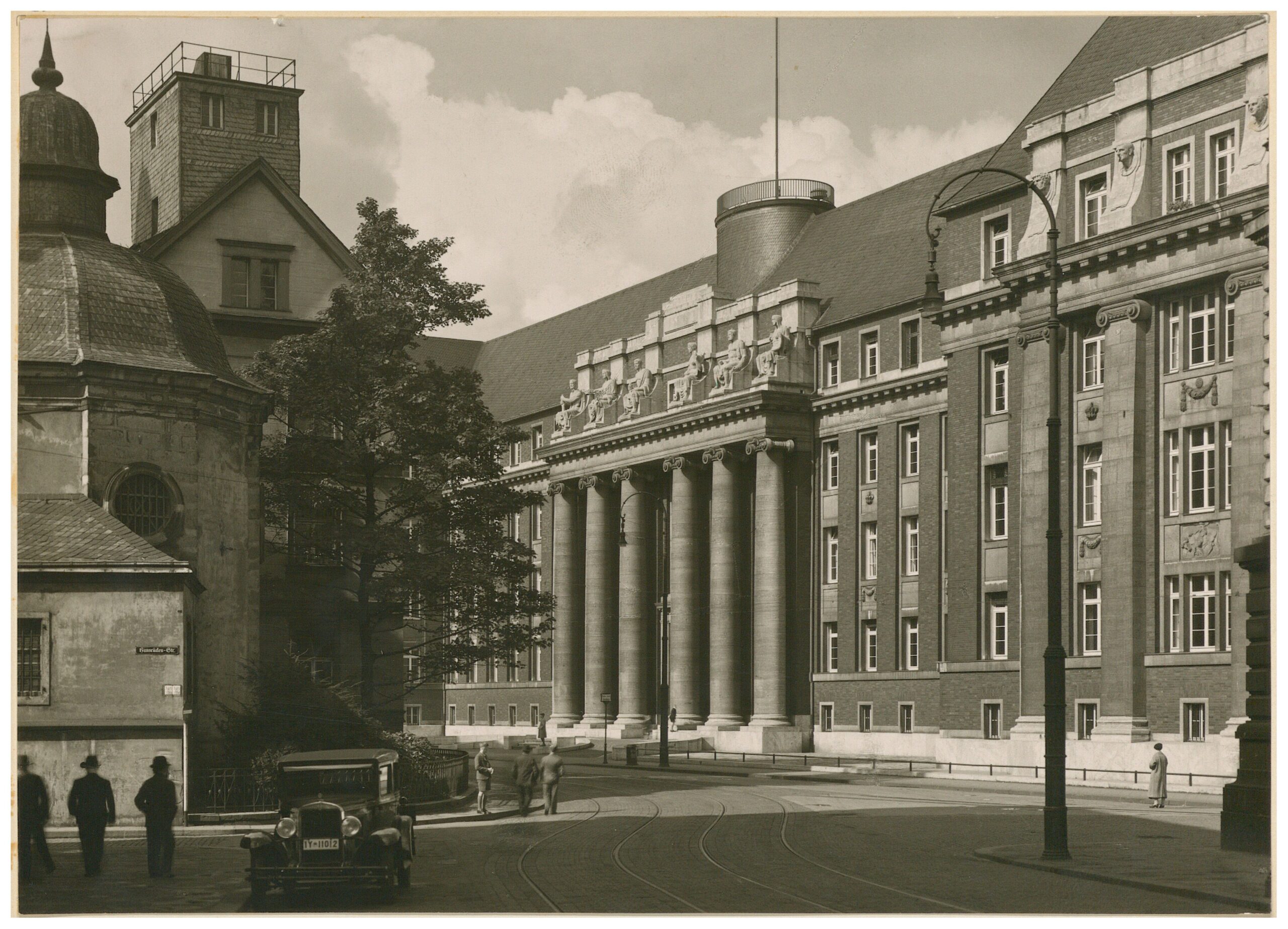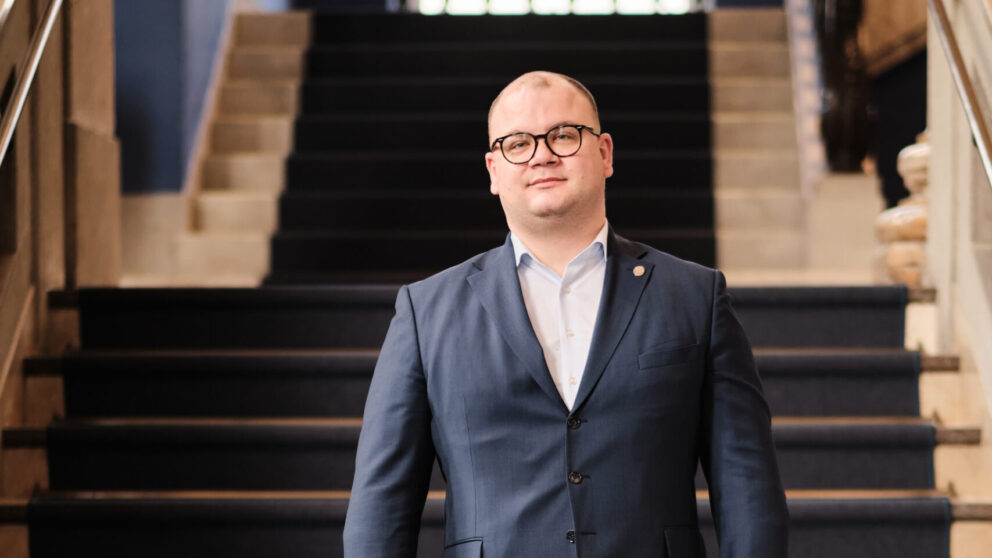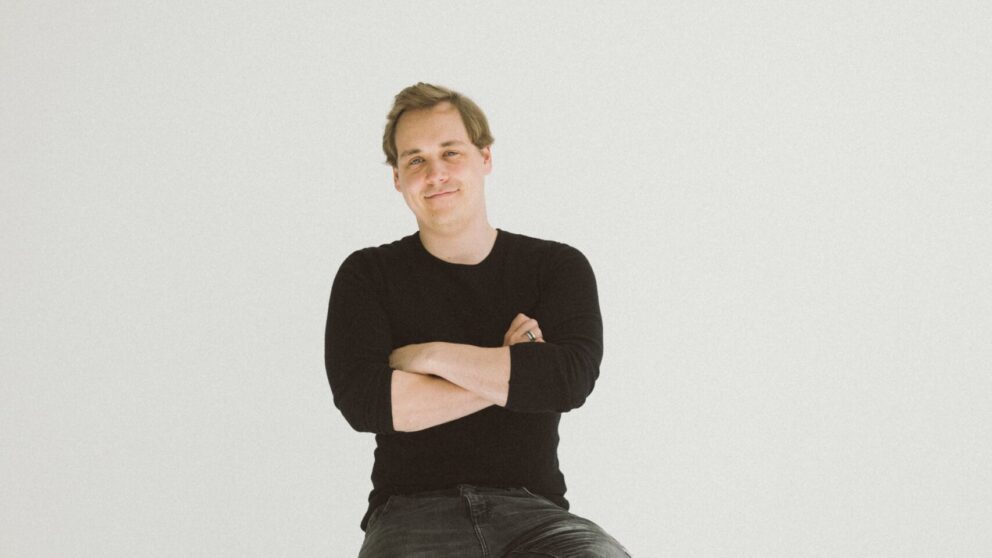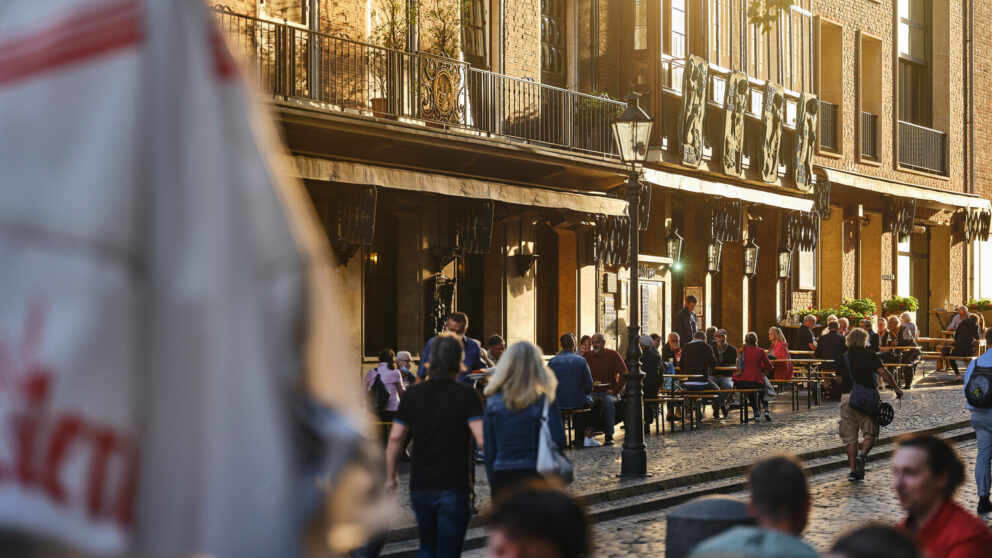
Six spectacular trials in the ex Palace of Justice in the Old Town
Six spectacular trials in the ex Palace of Justice in the Old Town
The boutique hotel The Wellem in the former county and district court breathes stories. We tell them to you.
The statue of Justitia, goddess of justice, towers above everything: Anyone who enters the huge, sophisticated reception hall immediately realizes that The Wellem at Mühlenstrasse 23 is no "normal" hotel. The ambience conjures up images in the mind: Judges and prosecutors strolling down the steps of the three-winged staircase on their way to the next hearing. Until 2010, the Düsseldorf Regional and Local Court resided in the Palace of Justice, which was completed in 1923 and has a neo-baroque facade and eye-catching entrance columns. Today, you can stay overnight here, in around one hundred luxurious suites and studios. Contemporary art plays an important role in the concept of the boutique luxury hotel named after the Elector Jan Wellem - both in the rooms, as well as in the in-house gallery and the six integrated restaurants and bars (including works by Jeff Koons and Julian Schnabel).
In the following, we present six court cases that caused a sensation at this historic location far beyond Düsseldorf's city limits. Perhaps one or the other case will sound familiar to you.
The Crossbow Murder Trial (1987)
A 21-year-old falls in love with the 58-year-old owner of a well-known ice cream parlor. He even rents her an apartment for their meetings, but she is jealous because the married man apparently has other affairs. Finally, the 21-year-old sees only one way to end the relationship: After a night spent together, she shoots her lover - as he lies asleep in bed in the morning. The fact that the case is being covered by the press throughout Germany and is being followed with great interest by the public is probably due above all to the unusual murder weapon: a crossbow. Experts diagnose a personality disorder in the perpetrator. At the main hearing, the judge sentences her to nine years in prison - for murder with limited criminal responsibility.
The Mannesmann Process (2004-2006)
In what is probably the most spectacular court case in German economic history, a "takeover battle" is being rehashed: Mannesmann and its successful and coveted D2 mobile communications division were taken over by the Vodafone Group at the turn of the millennium. Special payments and bonuses totaling 111 million deutschmarks are alleged to have been paid out in close connection with the takeover. Members of the German business elite and high-ranking representatives of trade unions are in the dock. A photo of the defendants in a good mood and confident of victory is being circulated in the media. However, the business bosses do not get off completely without punishment. The judges hear 55 witnesses, even via video link to Hong Kong. In the end, the outcome is a "draw: The case is dropped - in exchange for millions in fines.
The "Goldmaker" from Hilden (1930)
Heinz Kurschildgen, a 32-year-old from Hilden, claimed that he had developed a method for artificially producing gold from sheet metal or sand. In this way, he won investors who paid him up to 100,000 Reichsmarks. Of course, the expert reports turned out to be unfavorable to him, and so he was sentenced to 18 months in prison at the trial of the local court. Even after his release, Kurschildgen kept the courts busy. His next scam was "I can make gasoline from water." Even the National Socialists, such as Heinrich Himmler, are impressed and express interest. Once again, the fraud is followed by the receipt: three years in prison for fraud. But that's not all: In the 1950s, the goldmaker seeks a retrial. He wants to be recognized as a "persecuted person of the Nazi regime". And once again he fails in the face of the law. The case also made waves internationally: Today, even an English Wikipedia page documents the goings-on of the "Goldmaker of Hilden."
The Vampire of Dusseldorf (1931)
No criminal caused as much turmoil in the Weimar Republic as Peter Kürten, who was born in 1883. He received his nickname after he cut off the head of a swan in the Hofgarten in 1929 and drank its blood. The "vampire" later attempts the same on several of his human victims. The weapons of crime: Hammer, dagger and scissors. The police is in the dark, again and again Kürten manages to evade arrest. A mass hysteria arises in the population. Even the English crime novelist Edgar Wallace is said to have intervened and offered his help to the Düsseldorf police.In 1930, Kürten falls into the trap in the Rochus Church. At the trial, the court sentenced him to death for nine counts of murder and seven counts of attempted murder. A plea for clemency is rejected, and Kürten is executed in 1931. In the same year, director Fritz Lang is inspired by the case to make his famous film "M - a City in Search of a Murderer." This is the beginning of a whole series of works that artistically process the case of the "Vampire of Düsseldorf". Stephen King, for example, refers to Kürten in his horror novel "Brennen muss Salem," as does singer-songwriter Randy Newman in his play "Germany before the War." And in 2001, the BBC broadcast a TV documentary that got to the bottom of the serial killer's case in detail.
The missing Kö millionaire (1994)
In 1991, Otto-Erich Simon, the millionaire owner of two properties located on Königsallee, disappears without a trace. Eventually, suspicion falls on the building contractor who bought the properties at a bargain price, with what turns out to be a forged signature. The Kö millionaire, however, remains missing. Three years later, the case goes to court. 135 trial days, lots of witnesses. The unusual trial attracts court reporters from all over Germany to Mühlenstrasse. Der Spiegel writes: "It's not a crime novel, but reality, a case that surpasses any invention." And unlike in a crime novel, there is no satisfactory resolution here: the building contractor - by now suffering from depression - remains silent, the prosecution can prove nothing against him, and has to abandon the murder trial without a corpse. The main trial ends without a verdict. In 1997, the district court officially declares the Kö millionaire dead. In 2002, the court proceedings against the building contractor were discontinued due to his permanent inability to negotiate. And the two Kö properties are finally inherited by a nephew of the owner.
The Hells Angels Trial (2002)
After 79 days of trial and 68 witnesses, after 20 months, ten members of the motorcycle club will be sentenced to a total of 22 years in prison for aggravated robbery, predatory extortion, coercion, threats, theft and unauthorized possession of weapons. The mood is tense: Immediately after the verdict is announced, two dozen Harley-Davidson machines roll into the courtyard of the district court. The police observe the demonstration of solidarity and power of the partly masked colleagues of the convicted rockers with a squad of hundreds.
Title image: City archive, photographer: Hagemann, around 1930




